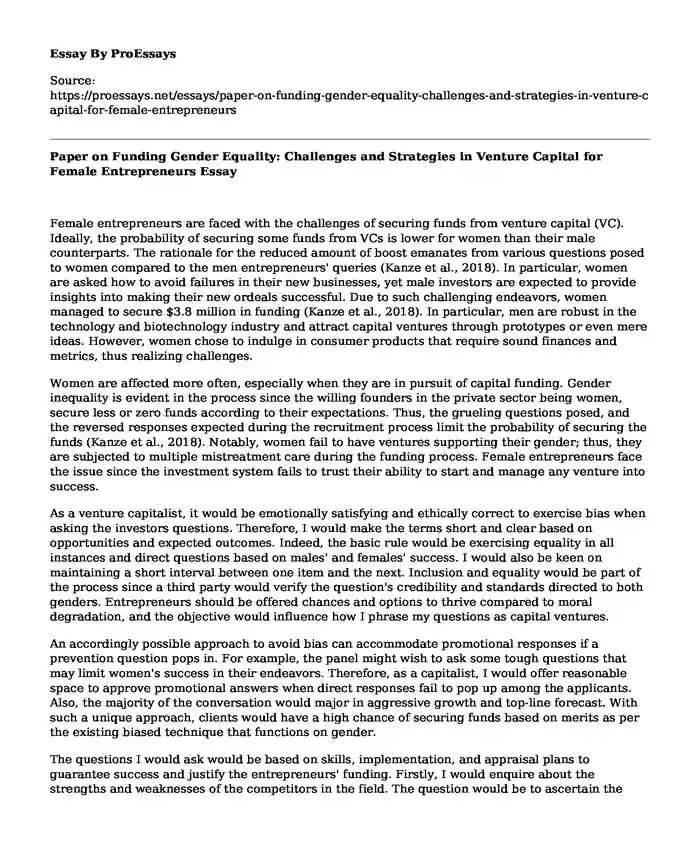Female entrepreneurs are faced with the challenges of securing funds from venture capital (VC). Ideally, the probability of securing some funds from VCs is lower for women than their male counterparts. The rationale for the reduced amount of boost emanates from various questions posed to women compared to the men entrepreneurs' queries (Kanze et al., 2018). In particular, women are asked how to avoid failures in their new businesses, yet male investors are expected to provide insights into making their new ordeals successful. Due to such challenging endeavors, women managed to secure $3.8 million in funding (Kanze et al., 2018). In particular, men are robust in the technology and biotechnology industry and attract capital ventures through prototypes or even mere ideas. However, women chose to indulge in consumer products that require sound finances and metrics, thus realizing challenges.
Women are affected more often, especially when they are in pursuit of capital funding. Gender inequality is evident in the process since the willing founders in the private sector being women, secure less or zero funds according to their expectations. Thus, the grueling questions posed, and the reversed responses expected during the recruitment process limit the probability of securing the funds (Kanze et al., 2018). Notably, women fail to have ventures supporting their gender; thus, they are subjected to multiple mistreatment care during the funding process. Female entrepreneurs face the issue since the investment system fails to trust their ability to start and manage any venture into success.
As a venture capitalist, it would be emotionally satisfying and ethically correct to exercise bias when asking the investors questions. Therefore, I would make the terms short and clear based on opportunities and expected outcomes. Indeed, the basic rule would be exercising equality in all instances and direct questions based on males' and females' success. I would also be keen on maintaining a short interval between one item and the next. Inclusion and equality would be part of the process since a third party would verify the question's credibility and standards directed to both genders. Entrepreneurs should be offered chances and options to thrive compared to moral degradation, and the objective would influence how I phrase my questions as capital ventures.
An accordingly possible approach to avoid bias can accommodate promotional responses if a prevention question pops in. For example, the panel might wish to ask some tough questions that may limit women's success in their endeavors. Therefore, as a capitalist, I would offer reasonable space to approve promotional answers when direct responses fail to pop up among the applicants. Also, the majority of the conversation would major in aggressive growth and top-line forecast. With such a unique approach, clients would have a high chance of securing funds based on merits as per the existing biased technique that functions on gender.
The questions I would ask would be based on skills, implementation, and appraisal plans to guarantee success and justify the entrepreneurs' funding. Firstly, I would enquire about the strengths and weaknesses of the competitors in the field. The question would be to ascertain the probability of succeeding in any business venture irrespective of the competition level. The second question would be how the investor would spend the funds on expansion, overhead, and capital. Ideally, the responses I would expect in the second question would help protect the client's vision. Ultimately, I would like to ask about the expected time frame for attaining the set goals and objectives. Generally, I would focus on the idea compared to the team behind any startup since technology and innovation require space in the modern era. The bottom line would be enhancing understanding and empathizing with women's difficulties in the quest for the entrepreneurship journey.
References
Kanze, D., Huang, L., Conley, M., & Higgins, E. (2018). We Ask Men to Win and Women Not to Lose: Closing the Gender Gap in Startup Funding. Academy Of Management Journal, 61(2), 586-614. https://doi.org/10.5465/amj.2016.1215
Cite this page
Paper on Funding Gender Equality: Challenges and Strategies in Venture Capital for Female Entrepreneurs. (2023, Dec 28). Retrieved from https://proessays.net/essays/paper-on-funding-gender-equality-challenges-and-strategies-in-venture-capital-for-female-entrepreneurs
If you are the original author of this essay and no longer wish to have it published on the ProEssays website, please click below to request its removal:
- Business Groups Argumentative Essay
- Literary Analysis Essay on Social Work with Immigration and Refugee
- Essay Sample on What Is Redlining and How Did Housing Covenant System Affect Communities of Colour
- Essay Sample on Race & White Privilege: Stereotypes, Prejudice, Discrimination & Racism
- Balancing Career & Family: The Warm Fuzz Case Study
- Advocacy for Survivors of Domestic Violence: Best Practices for Social Workers - Essay Sample
- Essay Example on Al-Qaeda: Global Terror Network with Extremist Roots







